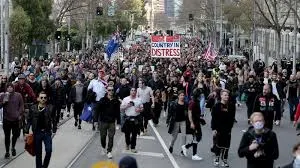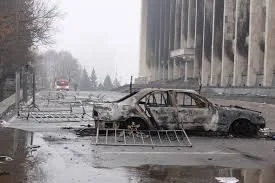“Your life will be distressed.” Protesters respond to Macron the way he threatened them
Anti-vaccine protesters in various cities across France have rejected President Emmanuel Macron's claim that he would "disrupt the lives" of those who refuse COVID-19 vaccines by tightening restrictions on their civil liberties.
Anti-vaccine protesters gathered in cities across France on Saturday to protest against President Emmanuel Macron's claim that he would "disrupt the lives" of those who refuse COVID-19 vaccines by tightening restrictions on their civil liberties.
A few days ago, Macron said that he wanted to make it difficult for those who did not receive vaccinations by making their lives difficult until they ended up being vaccinated. He described those who did not vaccinate themselves as irresponsible and not worthy of being considered citizens.
In Paris, protesters responded to Macron in kind, using the same vulgar words he had previously used, chanting: "Your life will hurt you."
Others held banners reading "No to the pass for vaccines," a reference to Macron's push for legislation requiring residents to show proof of vaccination to be allowed into places such as cafes, bars and museums.
Television footage showed skirmishes between protesters and police in one of the squares. Protesters also gathered in Marseille, Nantes and Le Mans, among other cities.
The protesters accuse Macron of stifling their freedoms and discriminatory treatment of citizens. Macron says that freedom entails responsibilities, including the preservation of the health of others.
More than 40 people were killed and 4,400 arrested in the unrest in Kazakhstan
Kazakhstan 's state television reported official figures, today, Saturday, indicating the arrest of more than 4,400 people, and the killing of more than 40 others, following the turmoil that the country has been witnessing for days.
It appears that these figures include deaths among the Kazakh security forces. The President of Kazakhstan, Kassym-Jomart Tokayev, issued an order declaring Saturday a day of national mourning, to remember "the many victims of the tragic events in some parts of the country."
And there are fears that the death toll could be much higher, after the president yesterday issued a firing order to quell protests against his government.
Tokayev claimed that a total of 20,000 "bandits" attacked Almaty, the largest city in the country, where particularly violent unrest has raged in recent days. He added that the "terrorists" were directed from abroad, but he did not disclose any further details.
The President of Kazakhstan asked the Collective Security Treaty Organization to help restore public order, and Russia deployed troops to Kazakhstan on Thursday.
Kazakhstan mourning declaration on Monday and Putin discusses with Tokayev "maintenance of order"
In a telephone conversation with his Kazakh counterpart, Kassem Tokayev, Russian President Vladimir Putin discussed the situation in Kazakhstan and the measures taken to maintain order following the violent demonstrations in the country, while Tokayev declared mourning on January 10, "in honor of the spirits of the protests."
Russian President Vladimir Putin and his Kazakh counterpart Kassym-Gomert Tokayev discussed the situation in Kazakhstan.
This came in a telephone conversation that Putin had with Tokayev, on Saturday, and a statement issued by the Kremlin indicated that the two leaders exchanged, in a telephone conversation, views on the measures taken to maintain order in it.
Tokayev told his Russian counterpart, Putin, during the call, that the situation in Kazakhstan is stabilizing.
The Kazakh President also thanked Putin for Russia's support within the framework of the Collective Security Treaty Organization.
The Collective Security Treaty Organization was established in May 1992 and includes Russia, Armenia, Belarus, Kazakhstan, Tajikistan and Kyrgyzstan.
Tokayev suggested that the organization's leaders hold a video summit in the near future, while Putin welcomed the proposal, and the two leaders agreed to keep in constant contact.
In a related context, the Kazakh President declared national mourning throughout the country, next Monday, January 10, in honor of the souls of the victims of the protests.
The Kazakh Presidency said in a statement, Saturday, that Tokayev issued a decision "to declare January 10 a national mourning, due to the casualties as a result of terrorist events in the country."
Since January 2, Kazakhstan has witnessed protests against the increase in gas prices, including casualties, looting and riots in Almaty, the country's largest city.
Those protests and events resulted in the killing of 26 protesters and the injury of hundreds, according to what the country's Ministry of Interior announced on Friday.
The government announced its resignation on Wednesday, against the backdrop of protests, followed by the imposition of a state of emergency throughout the country until January 19, with the aim of maintaining public security, according to local media.
Tags:
britain
europe
european countries
european union
france
paris
russia
ukraine
ukraine conflict
ukraine war
ukrainian coup
ukrainian crisis





